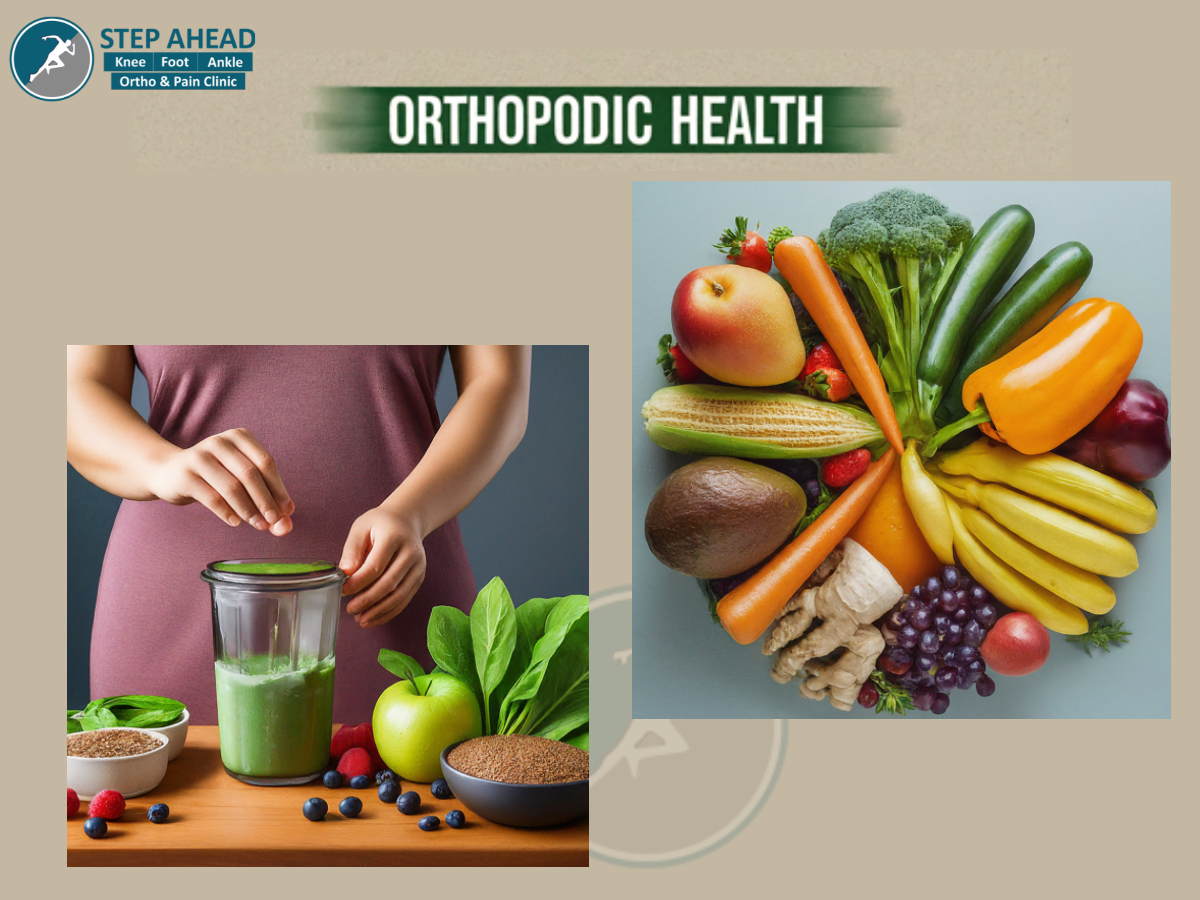Optimizing Orthopedic Health: The Role of Nutrition
At Step Ahead Orthopedic Clinic in Baner, we understand that orthopedic health is not just about treating injuries and managing pain—it’s also about nourishing your body from the inside out. Nutrition plays a crucial role in supporting bone and joint health, and making informed dietary choices can help enhance your overall orthopedic well-being. In this guide, we’ll explore the importance of nutrition for orthopedic health and provide practical tips to optimize your diet.
Understanding the Connection Between Nutrition and Orthopedic Health
Nutrition plays a vital role in maintaining healthy bones, joints, and muscles. A well-balanced diet provides essential nutrients that support bone density, promote tissue repair, and reduce inflammation. Conversely, poor dietary habits can contribute to the development of orthopedic conditions such as osteoporosis, osteoarthritis, and musculoskeletal injuries.
Essential Nutrients for Orthopedic Health
- Calcium: Calcium is crucial for bone health and strength. Incorporate calcium-rich foods such as dairy products, leafy greens, tofu, and fortified foods into your diet.
- Vitamin D: Vitamin D facilitates calcium absorption and helps maintain bone density. Get your daily dose of vitamin D from sunlight exposure, fatty fish, egg yolks, and fortified foods.
- Protein: Protein is essential for muscle repair and maintenance. Include lean sources of protein such as poultry, fish, beans, lentils, and nuts in your meals.
- Omega-3 Fatty Acids: Omega-3 fatty acids have anti-inflammatory properties that can help reduce joint pain and inflammation. Incorporate sources of omega-3s like fatty fish, flaxseeds, chia seeds, and walnuts into your diet.
- Antioxidants: Antioxidants help protect against oxidative stress and inflammation. Load up on colorful fruits and vegetables such as berries, oranges, tomatoes, and spinach to boost your antioxidant intake.
Practical Tips for a Bone-Healthy Diet
- Eat a Variety of Foods: Aim for a diverse diet rich in fruits, vegetables, whole grains, lean proteins, and healthy fats to ensure you’re getting a wide range of nutrients.
- Stay Hydrated: Drink plenty of water throughout the day to support joint lubrication and tissue hydration.
- Limit Processed Foods: Minimize your intake of processed and sugary foods, which can contribute to inflammation and weaken bone health.
- Monitor Portion Sizes: Pay attention to portion sizes to avoid excessive calorie intake, which can lead to weight gain and strain on your joints.
- Consider Supplements: If you’re unable to meet your nutritional needs through diet alone, speak with your orthopedic doctor or a registered dietitian about the potential benefits of supplements.
Incorporating Nutritional Strategies into Your Orthopedic Care Plan
- Consult with Your Orthopedic Doctor: Your orthopedic doctor in baner at Step Ahead Clinic can provide personalized nutritional guidance tailored to your specific orthopedic needs. They can assess your dietary habits, address any nutritional deficiencies, and recommend dietary changes to support your orthopedic health goals.
- Create a Balanced Meal Plan: Work with a registered dietitian to develop a balanced meal plan that meets your nutritional needs while supporting your orthopedic health. Your dietitian can help you incorporate nutrient-rich foods into your diet and ensure that you’re getting an adequate intake of key nutrients like calcium, vitamin D, and protein.
- Prioritize Bone-Boosting Foods: Focus on incorporating foods that are rich in bone-boosting nutrients into your daily meals. This includes dairy products, leafy greens, fortified foods, lean proteins, and sources of omega-3 fatty acids.
- Embrace Anti-Inflammatory Foods: Inflammation can exacerbate orthopedic conditions and contribute to pain and discomfort. Incorporate anti-inflammatory foods like berries, turmeric, ginger, and olive oil into your diet to help reduce inflammation and support joint health.
- Stay Hydrated: Proper hydration is essential for maintaining healthy joints and tissues. Make sure to drink an adequate amount of water throughout the day to support joint lubrication and overall hydration.
- Monitor Your Weight: Maintaining a healthy weight is crucial for reducing strain on your joints and preventing orthopedic issues like osteoarthritis. Work with your healthcare team to develop a plan for achieving and maintaining a healthy weight through diet and exercise.
- Stay Active: Regular physical activity is essential for maintaining strong bones and muscles, improving joint flexibility, and supporting overall orthopedic health. Incorporate a variety of low-impact exercises like walking, swimming, and yoga into your routine to keep your body moving and your joints healthy.
- Practice Mindful Eating: Pay attention to your body’s hunger and fullness cues, and practice mindful eating to avoid overeating and promote better digestion. Take the time to savor and enjoy your meals, and listen to your body’s signals of hunger and satisfaction.
By incorporating these nutritional strategies into your orthopedic care plan, you can support your body’s healing process, reduce the risk of orthopedic issues, and improve your overall quality of life. At Step Ahead Orthopedic Clinic in Baner, we’re here to help you achieve your orthopedic health goals through comprehensive care and personalized support. Contact us today to schedule an appointment with our team and take the first step towards better orthopedic health.
Conclusion: Prioritize Your Orthopedic Health with Proper Nutrition
At Step Ahead Clinic in Baner, we believe that nutrition is an essential component of orthopedic care. By adopting a balanced diet rich in essential nutrients, you can support your bone, joint, and muscle health and reduce the risk of orthopedic conditions. Our team of orthopedic specialists and pain specialists is committed to providing comprehensive care to help you achieve optimal orthopedic well-being. Contact us today to learn more about our services and how we can support your journey to better health.


